A Georgia Power of Attorney is defined as a legal form that allows a resident of Georgia to designate certain functions and powers to another individual or entity.
The party designating the functions and powers is known as the “Principal”, while the party being appointed through the form is referred to as an “Agent” or “Attorney-in-fact.” The powers and functions designated through a power of attorney (POA) can range from financial, health, business, legal, or any other, such as guardianship. The appointed agent is legally expected to represent the principal’s best interests and present the signed POA whenever carrying out their assigned duties.
Free POA Forms
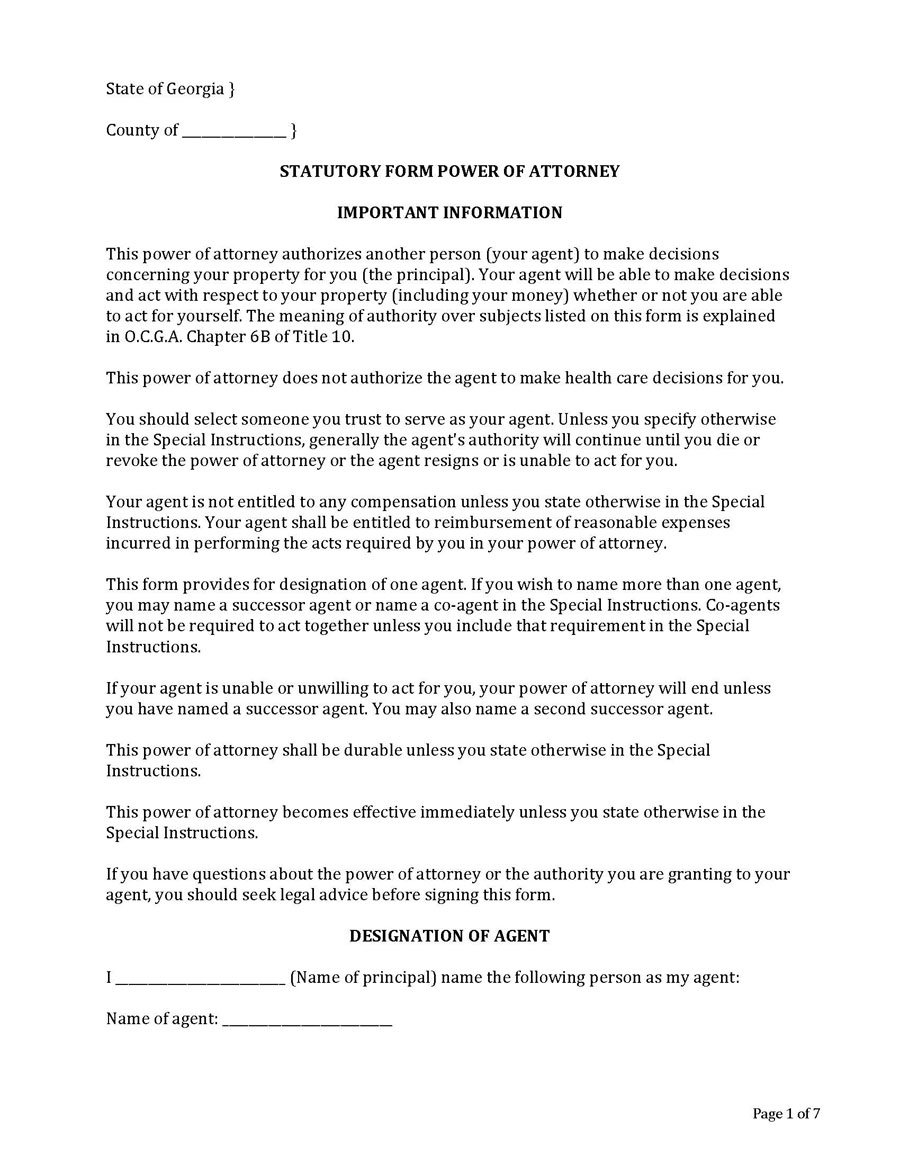
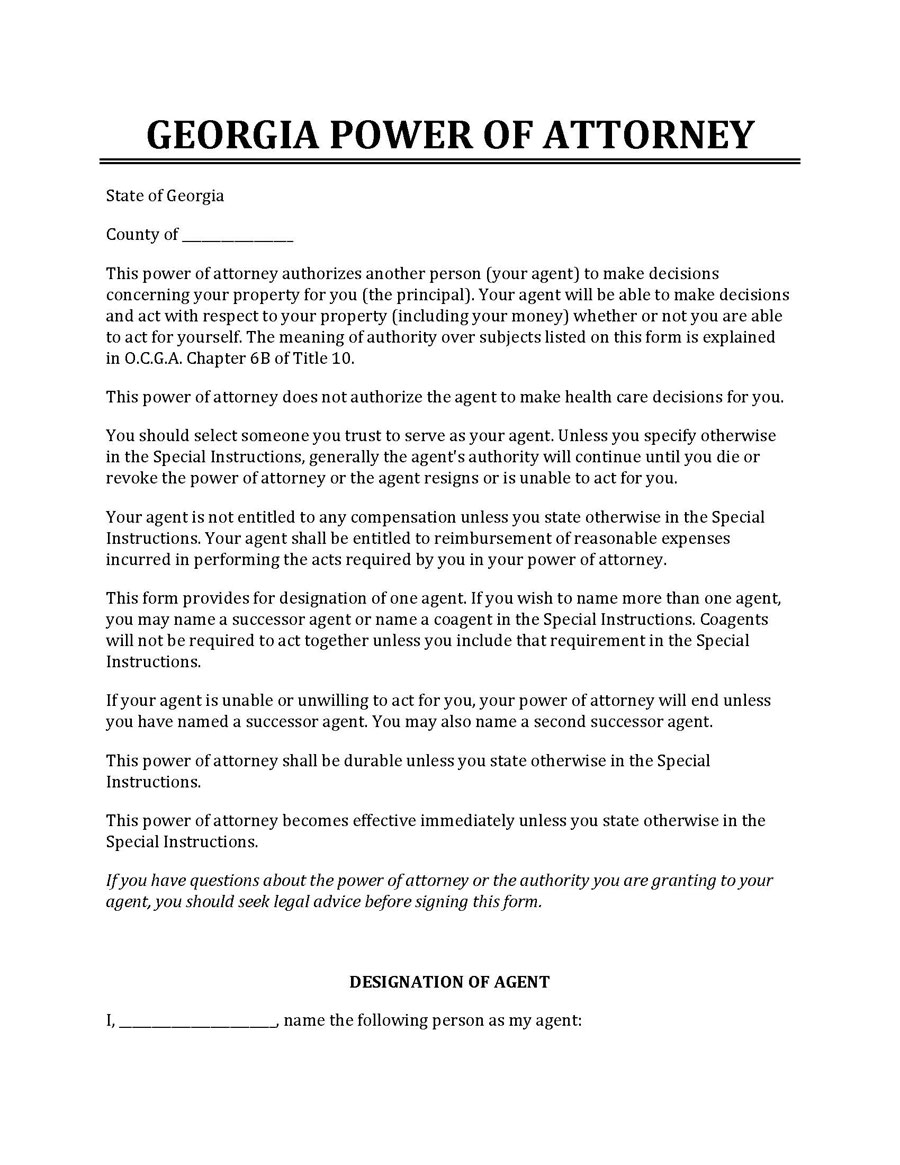
Related: Free Georgia Bill of Sale (Motor Vehicle) | Form T-7 (PDF)
Why Use a Statutory Form?
It is highly recommended that principals use a statutory form when creating a power of attorney in Georgia. The statutory form is written in legal language, which is essential in ensuring the Georgia power of attorney is familiar and acceptable to the business and medical communities. Note that the state of Georgia introduced a revised statutory form as of July 1, 2017. Therefore, the latest version of the form must be used. However, this does not invalidate any power of attorney created before the mentioned date.
Georgia POA Form Types
A power of attorney can vary based on the limitations of its powers and purpose. As a result, an individual should understand various types of forms before initiating a POA.
These types include:
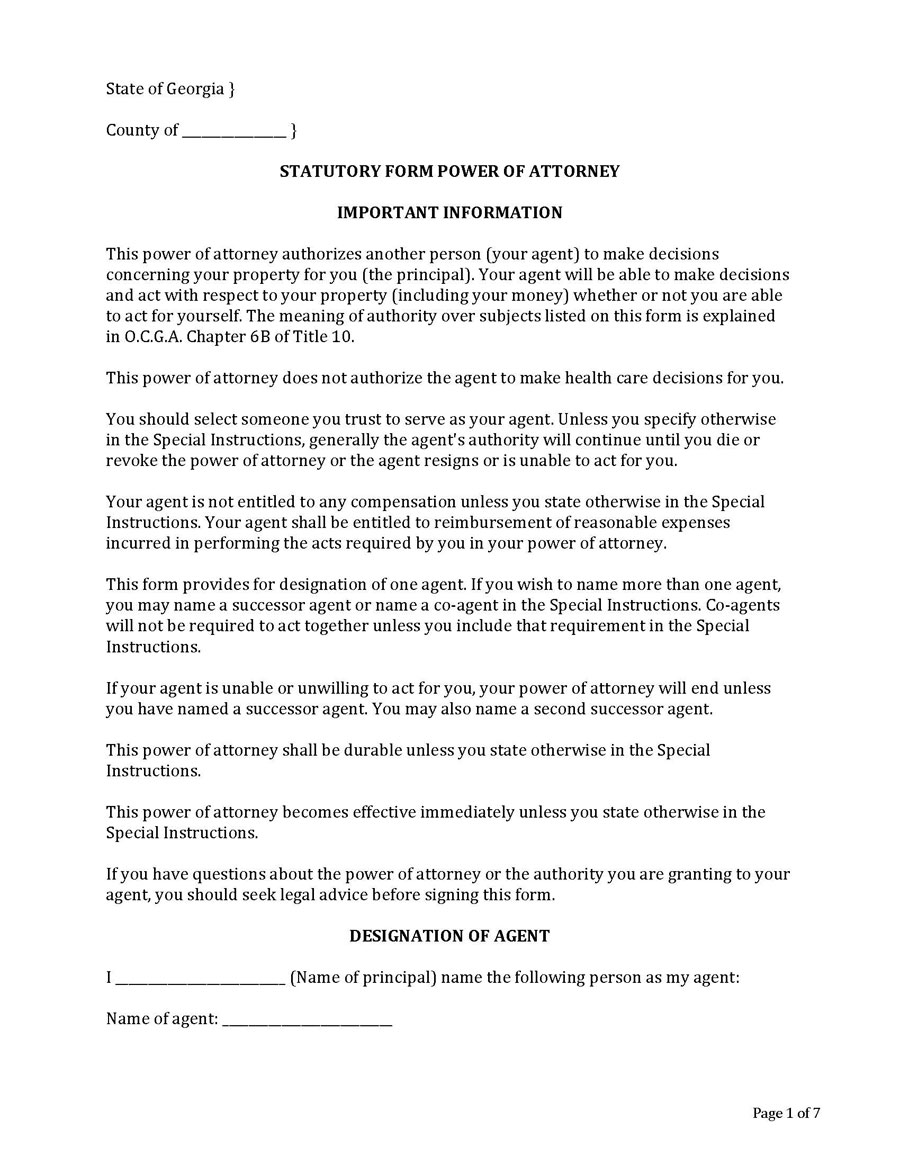
Durable (Statutory) Power of Attorney Form
Download: Microsoft Word (.docx)
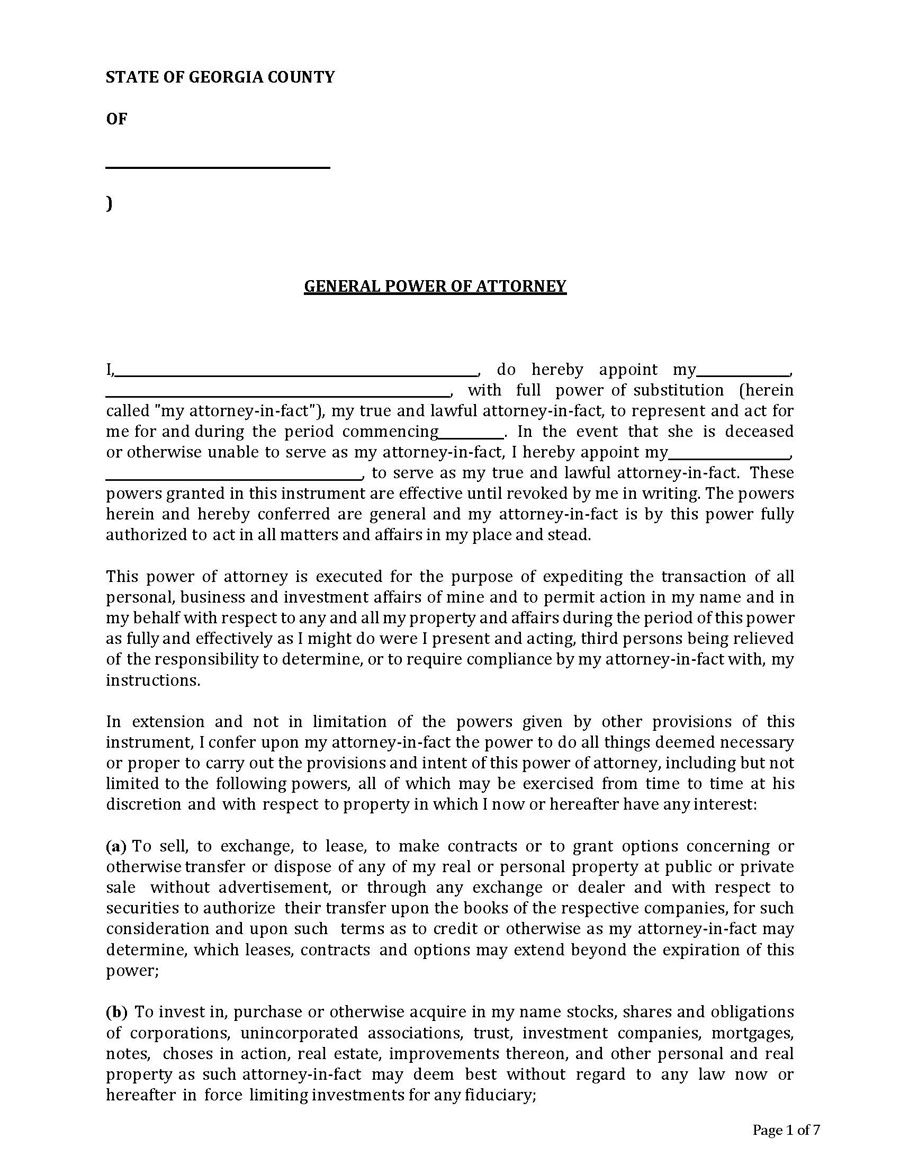
General (Financial) Power of Attorney Form
Download: Microsoft Word (.docx)
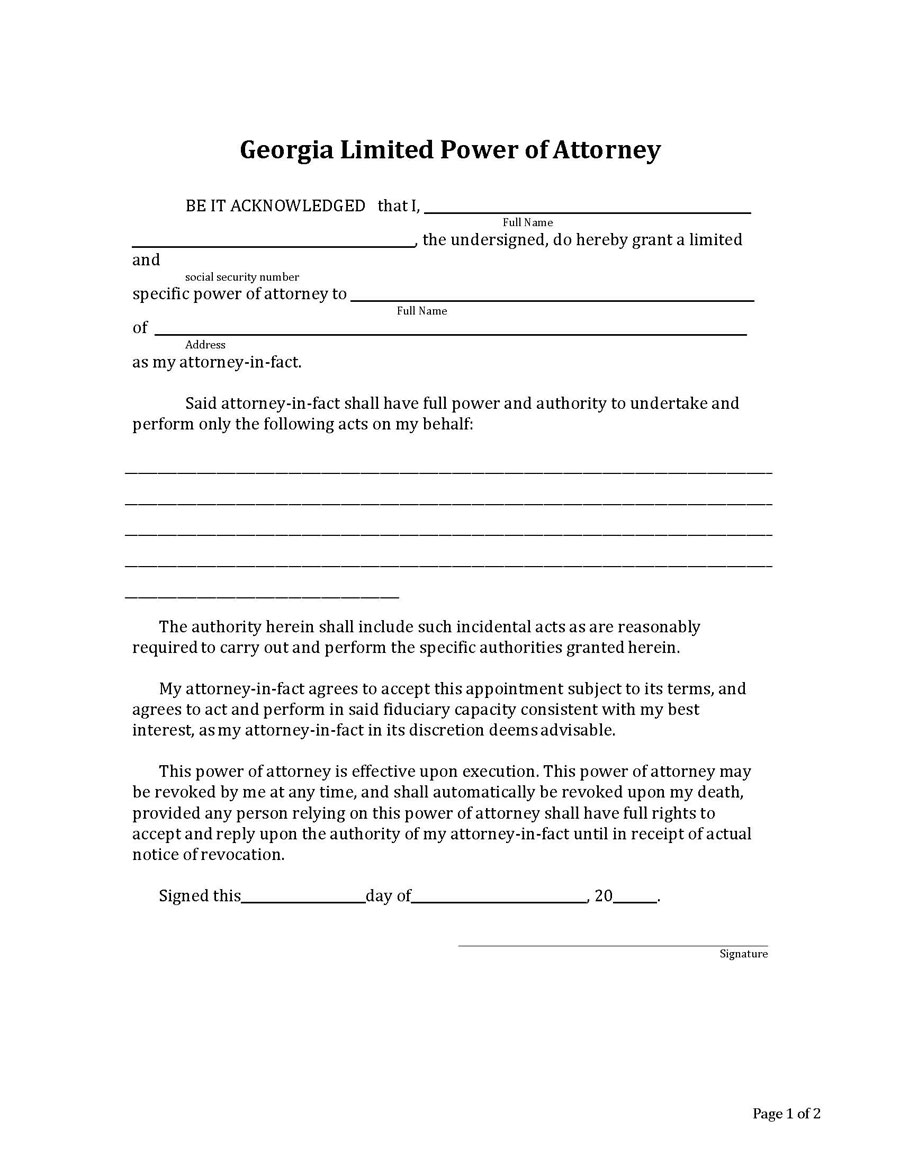
Limited Power of Attorney Form
Download: Microsoft Word (.docx)
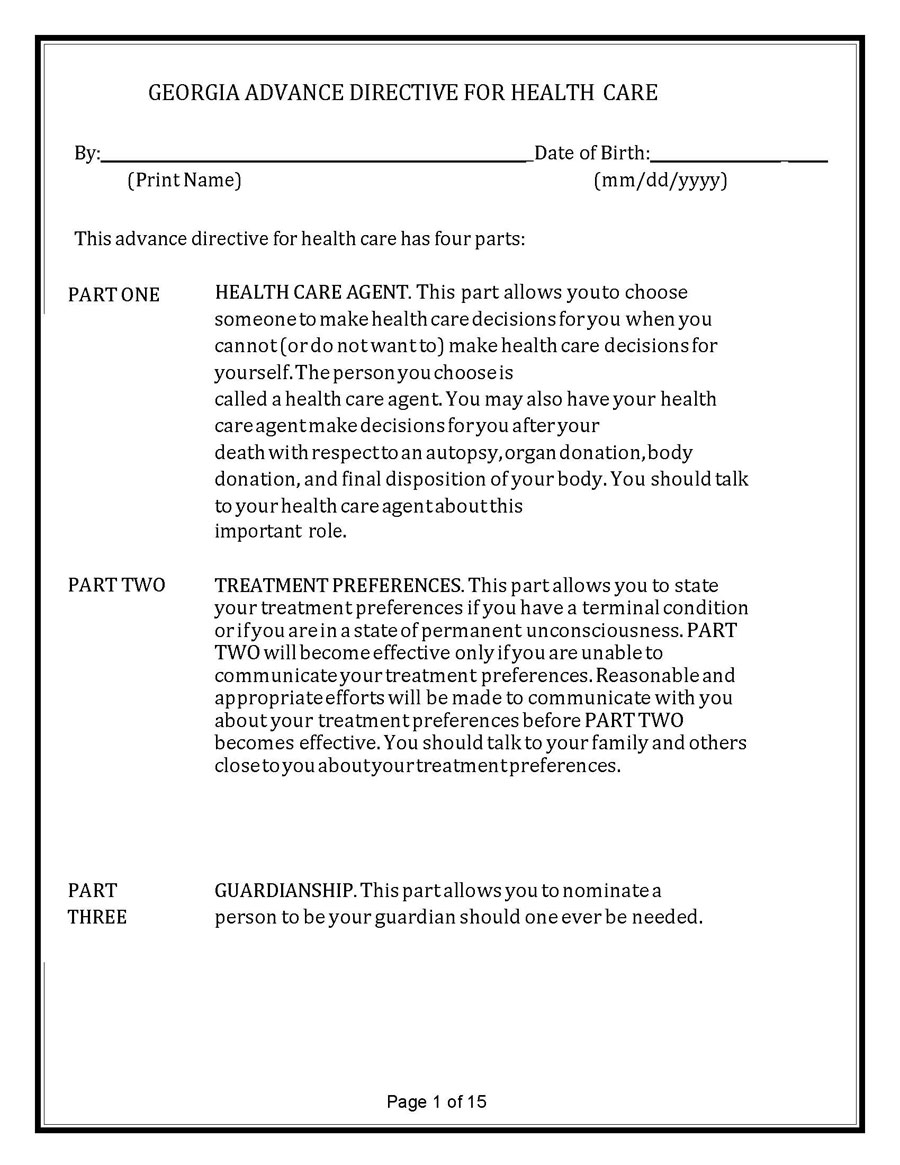
Medical Power of Attorney Form
Download: Microsoft Word (.docx)
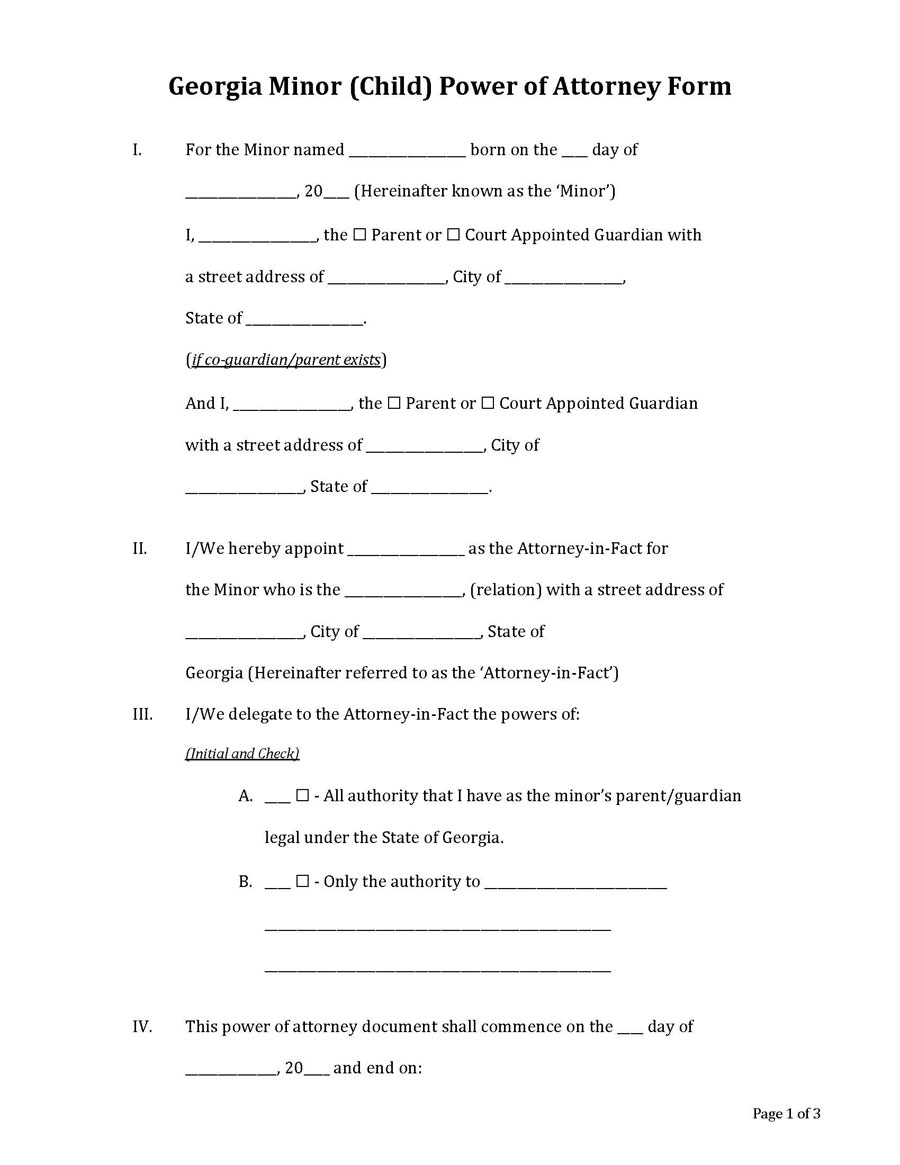
Minor (Child) Power of Attorney Form
Download: Microsoft Word (.docx)
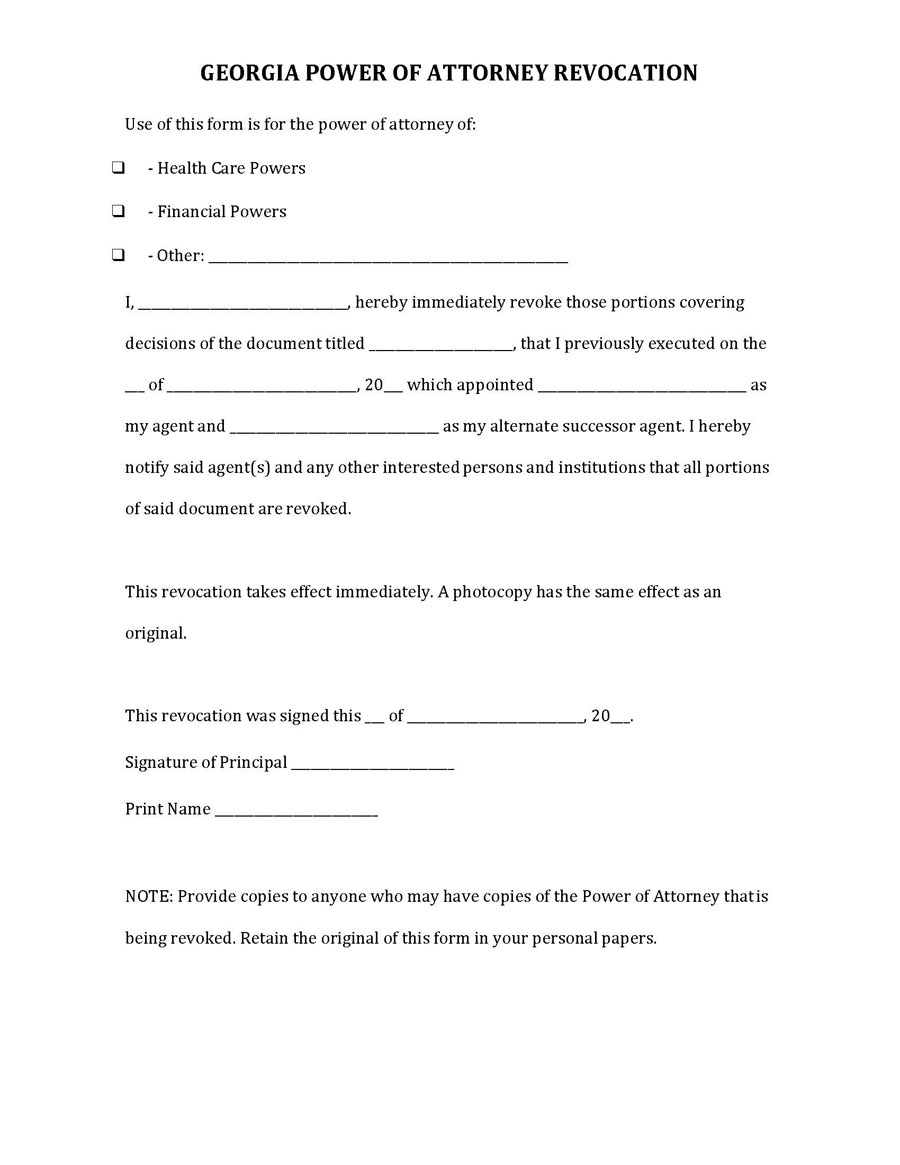
Revocation of Power of Attorney Form
Download: Microsoft Word (.docx)
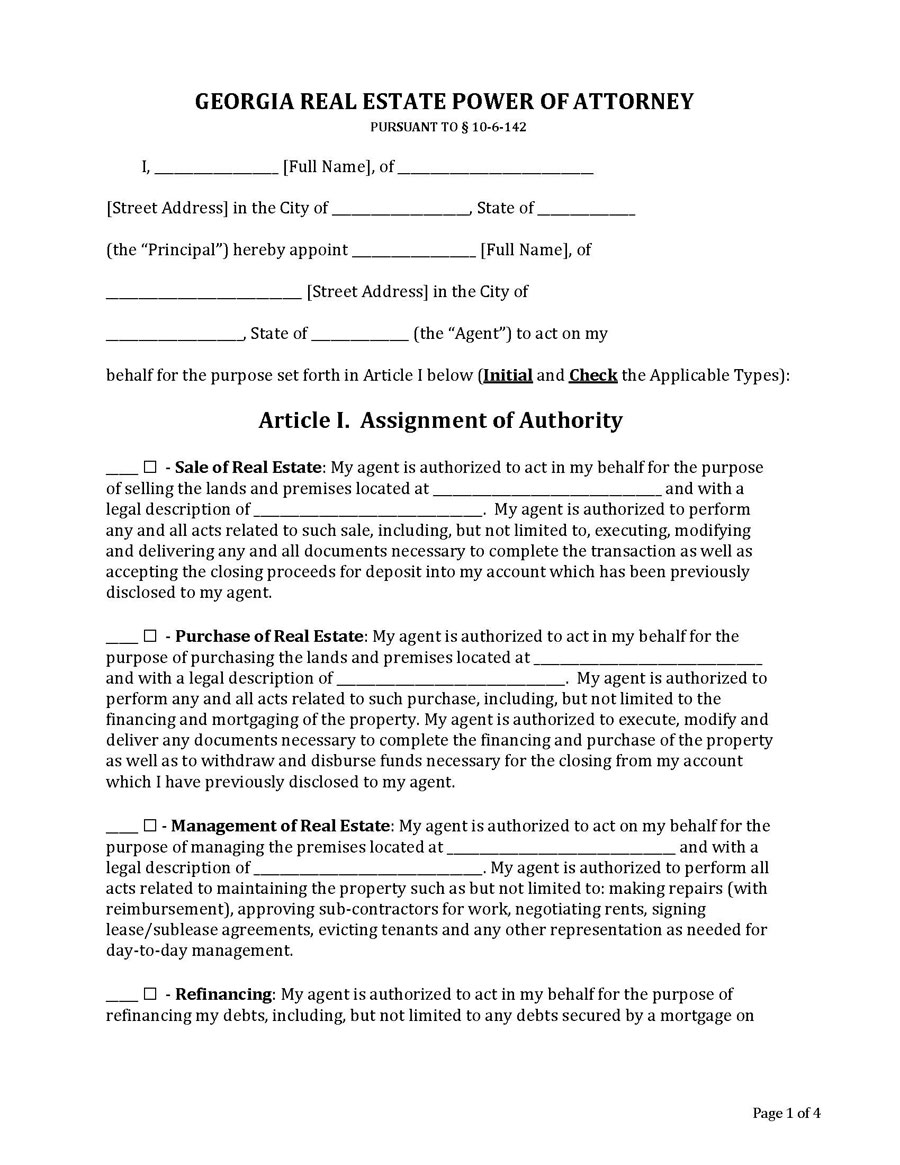
Real Estate Power of Attorney Form
Download: Microsoft Word (.docx)
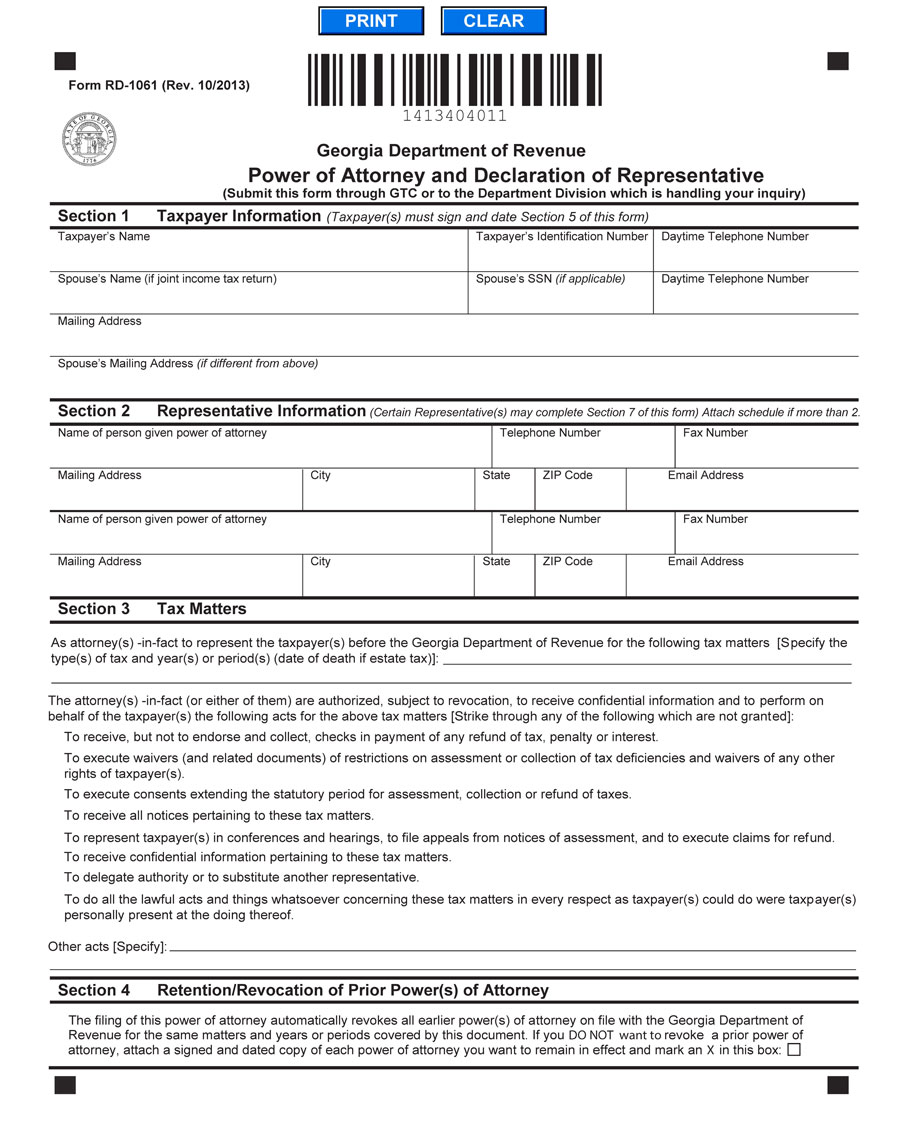
Tax Power of Attorney Form
Download: Microsoft Word (.docx)
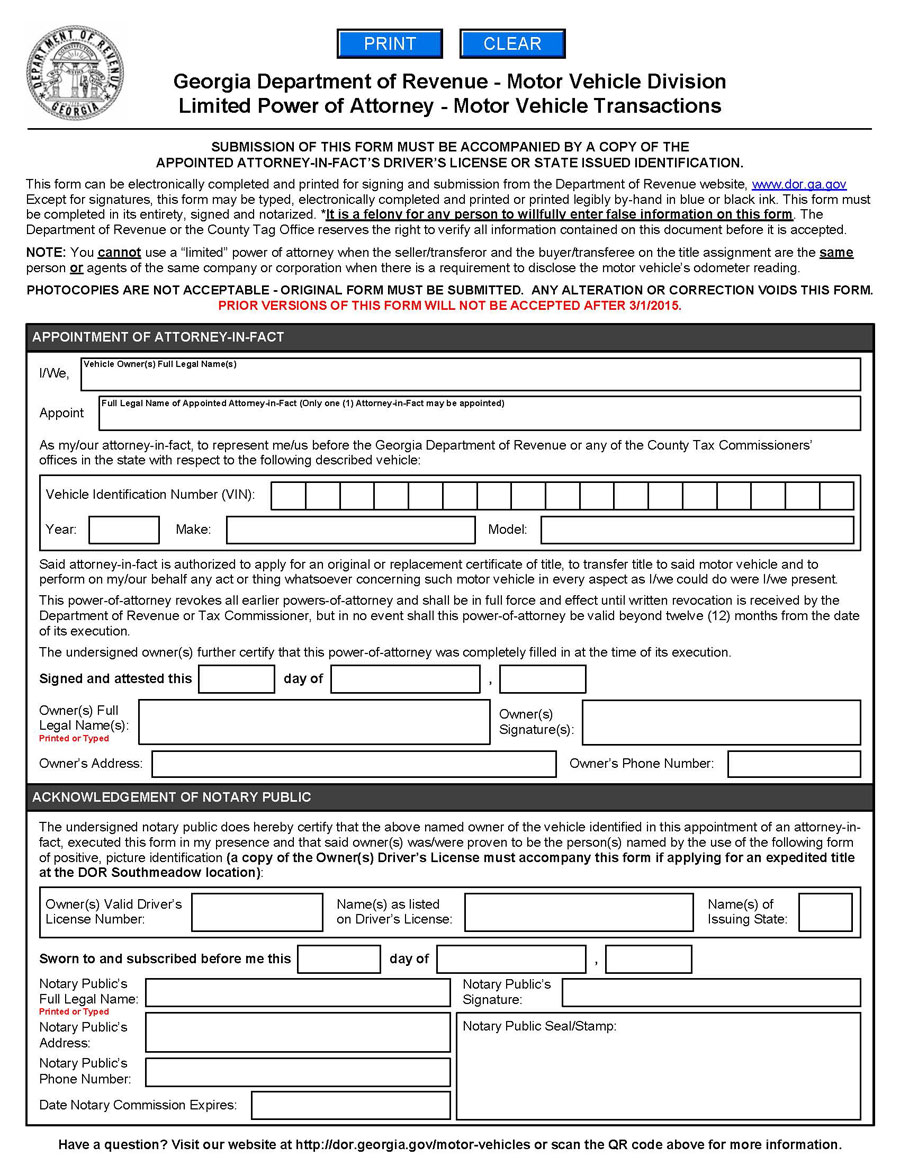
Vehicle Power of Attorney Form
Download: Microsoft Word (.docx)
Basics of Power of Attorney
Certain specifications have to be met for a power of attorney in Georgia to be legally enforceable within the state. Typically, there are several signatories it. They include the principal, one or two witnesses, and the notary public. However, the number of witnesses and the need for notarization will vary from one type of POA to another.
note
The notary public must not sign as a witness. Also, if the principal cannot sign the form themselves, they can select another person to sign the principal’s name in their presence.
The form must be signed with all the signatories present. Incapacitated principals should not initiate a power of attorney in Georgia. Under the law, incapacitation can be due to “an impairment in the principal’s ability to receive and evaluate information, make or communicate decisions even with the aid of technology” and must be ascertained by a registered physician or licensed psychologist.
Additionally, a principal who cannot perform financial and business transactions because they have been missing, detained (e.g., incarceration), out of the country, and unable to return as established by an attorney, judge, or appropriate government agent is deemed incapacitated in the state of Georgia.
Essential Factors to Know About POA in Georgia
Some factors should be considered and understood before both the principal and agent execute a Georgia power of attorney.
These essential factors include:
- The individual should be competent to sign a POA: It must be ascertained that the principal understands the stipulations of the POA form and is capable of communicating that they understand what and why they are signing the document. As a result, the state does not allow minors (less than 18 years old) or individuals without sound minds to initiate one in Georgia.
- The principal does not relinquish any rights: As much as the POA grants the agent legal authority to carry out the laid-out functions, the principal remains the primary decision-maker and executioner. The principal is legally allowed to reject and modify decisions made by the agent on their behalf. Additionally, the principal can revoke the POA at will.
- Well-drafted POA helps avoid expensive and time-consuming proceedings: Without a power of attorney in Georgia, the only way to obtain equivalent legal authority if the principal becomes incapacitated is through the court. However, such court proceedings can be time-consuming and expensive in terms of legal fees. Therefore, using a POA helps avoid such lengthy processes and ensures that the principal’s absence makes business and financial decisions go smoothly.
- The agent is supposed to do things as per instructions: The primary rule is that the agent must act in the principal’s best interest. Therefore, the agent must act according to the document’s stipulations and must not perform any function not explicitly stated in the form. Each power of attorney in Georgia grants unique legal authority, and the fact that one POA grants certain powers does not simultaneously imply all POA forms grant the same powers. As a result, it is greatly recommended that the POA be crafted by a professional well-informed in how to phrase the authority and powers of a POA.
- The authority granted in POA ceases as the principal dies: The validity of a Georgia POA ceases upon the demise of the principal. Therefore, the agent is not legally permitted to handle any duties on behalf of the principal. The legal authority to act on behalf of the departed must be obtained through a probate court.
How do I get the power of attorney in Georgia?
Acquiring a Georgia POA has been made convenient for residents, such that the statutory form has been made available online. Therefore, any principal wanting to use a POA can be assured of getting a state-specific and law-compliant form without involving a lawyer. However, involving an attorney is advisable to fine-tune the document. This is because the POA should be specific to the situation and use. Therefore, using the wrong form or language can be costly later on.
Below is a quick procedure for getting one in Georgia:
Documentation
Georgia requires that all POA forms satisfy specific documentation requirements. For example, the agreement ought to be in writing, name all the parties involved (principal and agent), be signed by the principal, witnessed, and notarized.
Capacity
Once the correct POA form has been selected, the capacity of the principal must be ascertained. They have to be of sound mind. If they are competent to convey the mentioned powers, they can sign the document. The form remains in effect until the principal becomes incapacitated or passes on unless the POA is durable.
Limitation
The validity of a Georgia power of attorney is subjected to certain limitations in terms of time and authority. In terms of time, the POA can be valid as long as the principal deems it necessary or up to its demise. No POA form remains valid after the revocation or death of the principal. In addition, limitations on the legal authority and powers of the agent can be imposed as deemed fit by the principal.
Granting powers
The power of the POA will typically be bestowed on the agent once the principal signs the document or once a specified event occurs after the document has been signed. The latter births a type of POA known as a springing POA. The event can be anything, as determined by the principal.
Frequently Asked Questions
Once signed into effect, the POA can be updated once it expires or its objective has been met. However, principals who initiated POAs before July 1, 2017, are urged to update their POAs to enjoy more protection from incompetent agents and require financial institutions to accept them compared to the previous POAs.
The chosen agent must be trustworthy and qualified to undertake the specified duties. Ideally, principals select qualified family members to perform the specific functions outlined in the form. However, in cases where an individual does not have a trustworthy confidant to appoint as their agent, they can always use a professional fiduciary as an agent.












